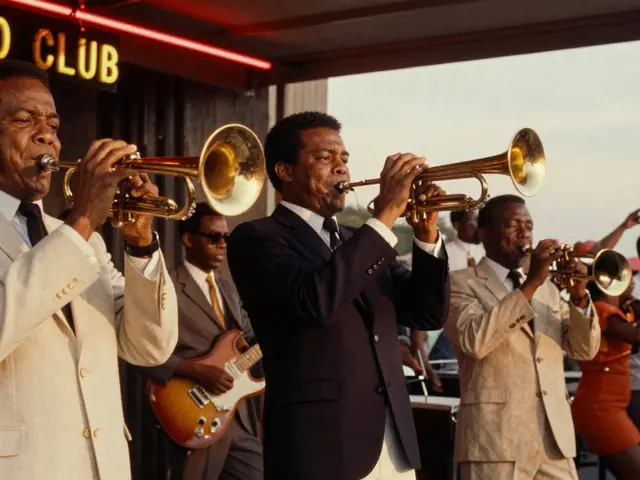The Beginnings of Soul: Dusting off the Records
Welcome to a journey back in time, carpet, breadcrumbs and all, to trace the roots of one of the most influential genres of music – soul. This tale takes us to the heart of the African-American experience in post-World War II USA. Shedding the bonds of segregation and fighting for civil rights, an inspiring community found its voice in soul music.
How did it start, you ask? Well, soul music was born in the mid-1950s to late 1960s, a melting pot of gospel, rhythm and blues, and jazz music. Remember the foot-tapping gospel music in churches that was part spiritual, part theatrical? Well, picture it all glammed up, throbbing with rhythm and blues, and you've got early soul music. Visionaries like Ray Charles and Sam Cooke were instrumental in hammering out the distinctive style elements of this genre.
The Golden Age: Power Houses and Power-Heavy Performances
Now imagine this - the 1960s. A decade positively buzzing with revolutionary energies, teeming with cultural upheaval, and an ideal incubating period for explosive soul music. This era is known as the Golden Age of soul – a time when this genre, anchored by powerhouse labels such as Motown, Stax, and Atlantic Records, shot to unprecedented heights in global popularity.
The music that poured out from these record powerhouses was a lot like those sand-art bottles we made as kids. All different colours - rhythm and blues, gospel, jazz, pop - coming together to form a beautiful, undulating whole. The soul artists of this period were deft painters of human emotion. Little snippets from my life - Parke's first steps, or when Mabel graffitied the walls with her 'art' - have songs tied to them. For me, as for many, these songs have become time portals triggering sweet nostalgia.
Decoding the Soul: Stretching the Vocal Chords
In soul music, the spotlight always found itself drawn, like a besotted moth, to the emotive power of the human voice. A hallmark of this genre is the unabashed expression of raw emotions. And how was it achieved? Well, through the vibrant diversity, innovativeness and sheer dexterity of the vocal techniques employed by soulful crooners.
Remember Marvin Gaye's impassioned runs in 'What's Going On?' or Aretha Franklin's electrifying belts in 'Respect'? They stamped their unique signatures on these songs with their distinctive vocal techniques. These artists didn't just sing about love, pain, joy, or heartbreak - they invited us into experiencing these feelings with them, one riff, one run, one improvisation at a time.
Footprints of Soul: The Wide-Spreading Influence
The influence of soul music is as vast as the Australian Outback. From pop to rock, R&B to hip-hop, it's hard to find a genre that hasn't been touched by the magic of soul. Even today, flick your radio on, and you're bound to hear echoes of soul in the lyrics and melodies that have the power to shake up one's soul.
Not only did the soul impact its contemporaries but also gave birth to sub-genres like Neo-Soul, Psychedelic soul, Blue-Eyed soul, and so many more. Just like how our kids carry a part of us, yet have their uniqueness, these genres too carried the legacy of soul while weaving in their charm.
Modern Soul Stalwarts: Carrying the Torch
Just when folks were starting to think soul music had sung its swan song, along came a new generation of torchbearers. Singers like Amy Winehouse, Adele, Leon Bridges, and Alicia Keys refuse to let soul fade into obscurity, instead infusing it with modern elements to keep it relevant and appealing to this digital age.
I remember watching Amy Winehouse's 'Back to Black' performance on the telly, utterly speechless. It wasn't just her voice or the words she sang. It was the face-aching honesty that ran through every line. It was like someone had taken the '60s and '70s, given them a good shake, a spritz of the contemporary, and voila, we had today's soul music.
Heart Beats and Soul Strings: Soul Music Tips
Have you ever thought of exploring soul music further, maybe even teaching your vocal cords to mimic these age-defying runs and riffs? Let me impart some nuggets of wisdom for initiates on this soulful exploration. Soul music, firstly, is all about feelings. So, let down your guard, dig deep, and let your heart take the lead. Listen and sing along to the classics before trying to tackle more modern or derivative works.
Remember, soulful singing is not a race, it's a journey. It's about conveying the depths of human emotions, something I believe each one of us is capable of. After all, who hasn't felt love, sorrow, joy, or pain? As a tip, try matching the tone, pitch, and emotional intensity of some of your favourite soul singers. Consider it like a training-wheels kind of exercise before freestyling on your own.
Soul Music: A Tune for All Times
If you think about it, soul music is a lot like us humans. It keeps evolving, adapting, and yet, at its core it carries the indelible essence of its roots, its soulful beginnings. Whether it's the golden-age classics, its influential sub-genres or its modern proteges, soul music is not just a genre; it's the eternal rhythm of human experience.
So there you have it, sweethearts. The evolution of soul music, dusted, buffed and served up for your enjoyment. And while my kids' soul music these days often sounds like nursery rhymes played on repeat, I look forward to the day when they too can understand and appreciate the depth of soul music. The day they realize that music, especially soul music, is, in essence, a celebration of being human.






